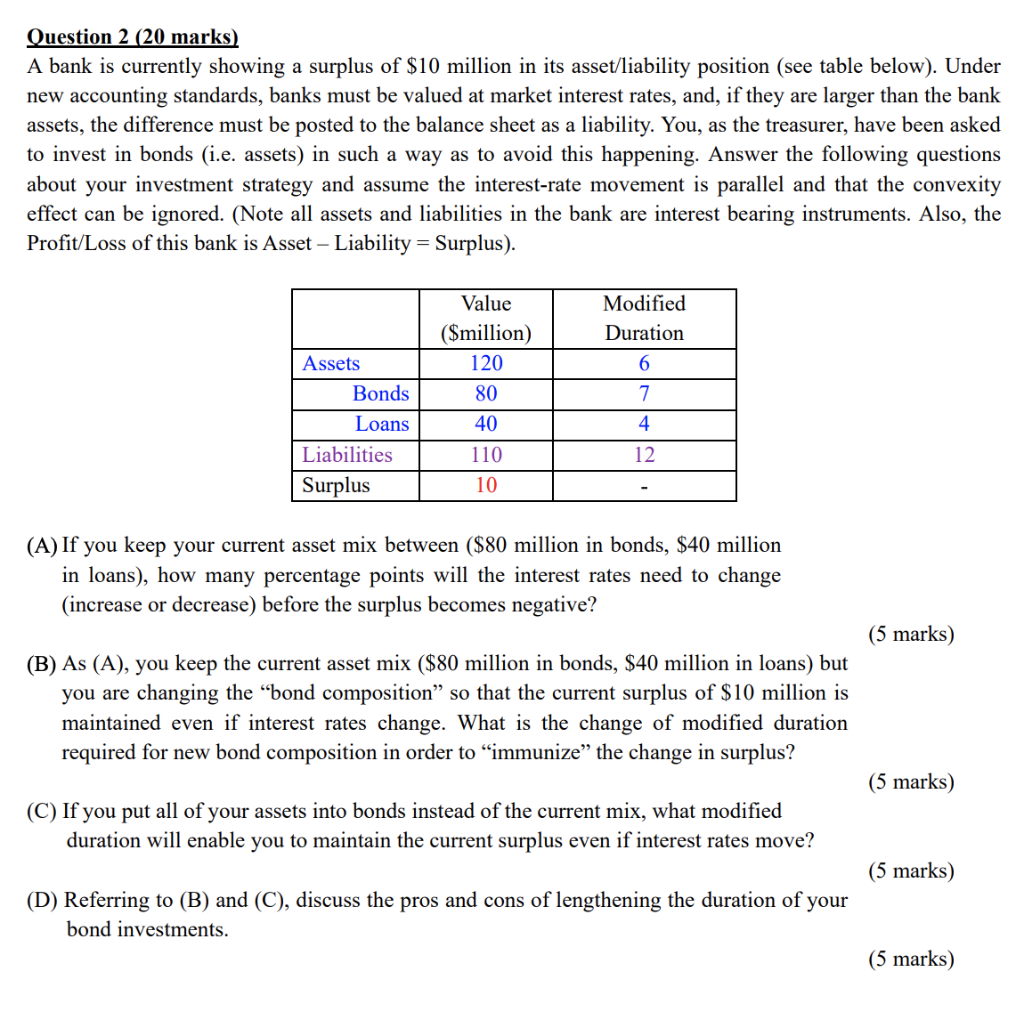
Question 2 (20 marks) A bank is currently showing a surplus of $10 million in its asset/liability position (see table below). Under new accounting standards, banks must be valued at market interest rates, and, if they are larger than the bank assets, the difference must be posted to the balance sheet as a liability. You, as the treasurer, have been asked to invest in bonds (i.e. assets) in such a way as to avoid this happening. Answer the following questions about your investment strategy and assume the interest-rate movement is parallel and that the convexity effect can be ignored. (Note all assets and liabilities in the bank are interest bearing instruments. Also, the Profit/Loss of this bank is Asset - Liability = Surplus). - = Value ($million) 120 80 40 Modified Duration 6 7 Assets Bonds 4 Loans Liabilities Surplus 12 110 10 (A) If you keep your current asset mix between ($80 million in bonds, $40 million in loans), how many percentage points will the interest rates need to change (increase or decrease) before the surplus becomes negative? (5 marks) (B) As (A), you keep the current asset mix ($80 million in bonds, $40 million in loans) but you are changing the bond composition so that the current surplus of $10 million is maintained even if interest rates change. What is the change of modified duration required for new bond composition in order to immunize the change in surplus? (5 marks) (C) If you put all of your assets into bonds instead of the current mix, what modified duration will enable you to maintain the current surplus even if interest rates move? (5 marks) (D) Referring to (B) and (C), discuss the pros and cons of lengthening the duration of your bond investments. (5 marks) Question 2 (20 marks) A bank is currently showing a surplus of $10 million in its asset/liability position (see table below). Under new accounting standards, banks must be valued at market interest rates, and, if they are larger than the bank assets, the difference must be posted to the balance sheet as a liability. You, as the treasurer, have been asked to invest in bonds (i.e. assets) in such a way as to avoid this happening. Answer the following questions about your investment strategy and assume the interest-rate movement is parallel and that the convexity effect can be ignored. (Note all assets and liabilities in the bank are interest bearing instruments. Also, the Profit/Loss of this bank is Asset - Liability = Surplus). - = Value ($million) 120 80 40 Modified Duration 6 7 Assets Bonds 4 Loans Liabilities Surplus 12 110 10 (A) If you keep your current asset mix between ($80 million in bonds, $40 million in loans), how many percentage points will the interest rates need to change (increase or decrease) before the surplus becomes negative? (5 marks) (B) As (A), you keep the current asset mix ($80 million in bonds, $40 million in loans) but you are changing the bond composition so that the current surplus of $10 million is maintained even if interest rates change. What is the change of modified duration required for new bond composition in order to immunize the change in surplus? (5 marks) (C) If you put all of your assets into bonds instead of the current mix, what modified duration will enable you to maintain the current surplus even if interest rates move? (5 marks) (D) Referring to (B) and (C), discuss the pros and cons of lengthening the duration of your bond investments







